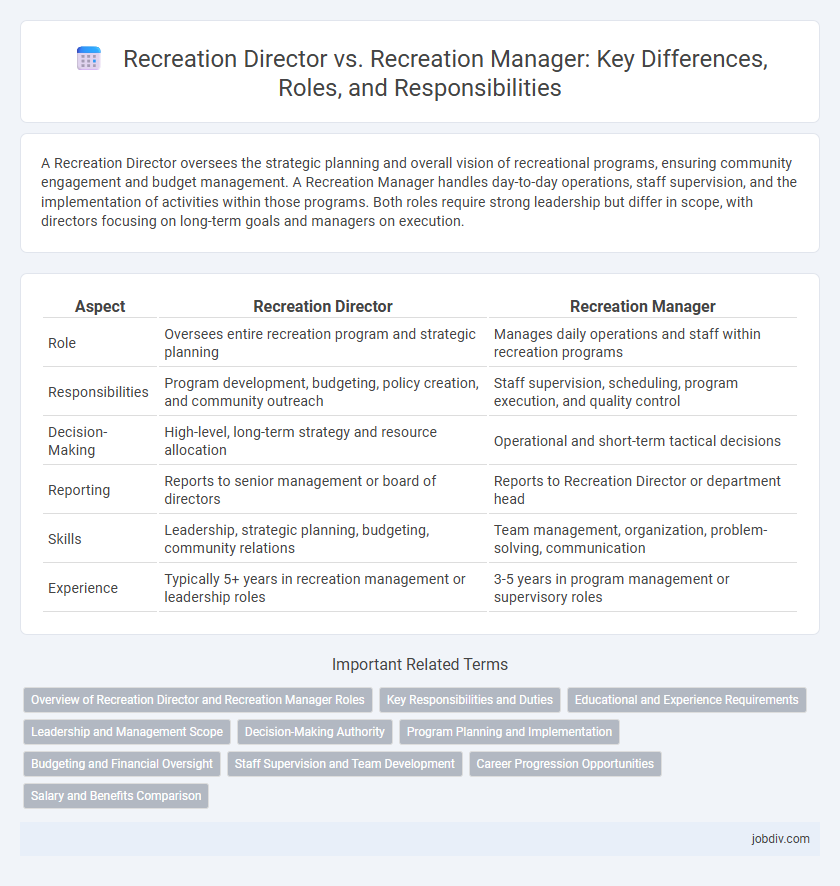A Recreation Director oversees the strategic planning and overall vision of recreational programs, ensuring community engagement and budget management. A Recreation Manager handles day-to-day operations, staff supervision, and the implementation of activities within those programs. Both roles require strong leadership but differ in scope, with directors focusing on long-term goals and managers on execution.
Table of Comparison
| Aspect | Recreation Director | Recreation Manager |
|---|---|---|
| Role | Oversees entire recreation program and strategic planning | Manages daily operations and staff within recreation programs |
| Responsibilities | Program development, budgeting, policy creation, and community outreach | Staff supervision, scheduling, program execution, and quality control |
| Decision-Making | High-level, long-term strategy and resource allocation | Operational and short-term tactical decisions |
| Reporting | Reports to senior management or board of directors | Reports to Recreation Director or department head |
| Skills | Leadership, strategic planning, budgeting, community relations | Team management, organization, problem-solving, communication |
| Experience | Typically 5+ years in recreation management or leadership roles | 3-5 years in program management or supervisory roles |
Overview of Recreation Director and Recreation Manager Roles
Recreation Directors oversee the planning, development, and evaluation of recreational programs and services for communities, ensuring alignment with organizational goals and budget constraints. Recreation Managers focus on the daily operations, staff supervision, and facility management to implement the programs designed by directors effectively. Both roles require strong leadership, communication skills, and knowledge of community needs to promote healthy, engaging recreational activities.
Key Responsibilities and Duties
A Recreation Director oversees the strategic planning and development of recreational programs, manages departmental budgets, and ensures compliance with regulatory standards, focusing on community engagement and resource allocation. In contrast, a Recreation Manager handles day-to-day operations, supervises staff, coordinates schedules, and implements program activities to meet organizational goals. Both roles collaborate to enhance visitor experiences, promote wellness initiatives, and optimize facility usage within parks and recreation departments.
Educational and Experience Requirements
A Recreation Director typically requires a bachelor's degree in recreation management, leisure studies, or a related field, along with several years of supervisory experience in recreational programs. In contrast, a Recreation Manager often holds similar educational qualifications but may need more specialized training or certifications, such as CPR or first aid, combined with experience in managing specific recreational activities or staff. Both roles emphasize leadership skills and practical knowledge, but the Director position demands broader strategic planning expertise and higher-level administrative experience.
Leadership and Management Scope
A Recreation Director oversees the strategic vision and overall leadership of recreational programs, ensuring alignment with organizational goals and community needs. Recreation Managers handle the day-to-day operations, staff supervision, and implementation of specific recreational activities within the scope defined by the director. The director's role involves broader policy development and long-term planning, whereas the manager focuses on operational management and direct team leadership.
Decision-Making Authority
Recreation Directors hold higher decision-making authority, overseeing program development, budget allocation, and strategic planning for recreation departments or organizations. Recreation Managers typically manage daily operations, implement programs, and supervise staff within the framework established by the directors. The director's role involves long-term policy decisions, while the manager focuses on operational execution and immediate problem-solving.
Program Planning and Implementation
A Recreation Director oversees the strategic program planning and implementation, ensuring alignment with organizational goals and community needs. A Recreation Manager focuses on the day-to-day execution of these programs, coordinating staff and resources to deliver effective recreational activities. Both roles require strong leadership and expertise in program development, but the director emphasizes long-term vision while the manager handles operational details.
Budgeting and Financial Oversight
A Recreation Director typically holds overall responsibility for budgeting and financial oversight within recreation programs, ensuring alignment with organizational goals and long-term fiscal planning. Recreation Managers often focus on managing specific budgets for individual programs or facilities, monitoring expenditures, and reporting financial status to the director. Both roles require strong financial acumen, but the director has a broader strategic financial role while managers handle operational budget execution.
Staff Supervision and Team Development
Recreation Directors typically oversee multiple Recreation Managers and are responsible for creating strategic staff development plans, ensuring overall team performance aligns with organizational goals. Recreation Managers focus on supervising day-to-day operations, providing direct guidance, training, and support to front-line staff members to optimize program delivery. Both roles require strong leadership skills, but Recreation Directors emphasize long-term team growth while Recreation Managers concentrate on immediate staff management and operational efficiency.
Career Progression Opportunities
Recreation Directors typically oversee program development and strategic planning for community recreation services, while Recreation Managers focus on daily operations and staff supervision within specific facilities. Career progression often involves advancing from Recreation Manager to Recreation Director, leveraging experience in leadership, budgeting, and program evaluation. Professional certifications like CPRP (Certified Park and Recreation Professional) can enhance promotion prospects in this field.
Salary and Benefits Comparison
Recreation Directors typically earn an average salary ranging from $50,000 to $75,000 annually, with benefits including health insurance, retirement plans, and paid time off, while Recreation Managers often receive salaries between $45,000 and $70,000, with similar benefit packages but sometimes fewer executive perks. Salary variations depend on location, organization size, and individual experience, with directors usually commanding higher pay due to greater responsibility and leadership roles. Benefits for both positions commonly feature wellness programs and professional development opportunities tailored to recreation and community services professionals.
Recreation Director vs Recreation Manager Infographic

 jobdiv.com
jobdiv.com